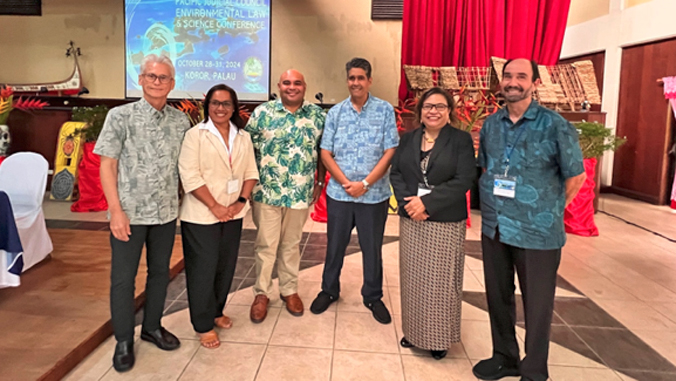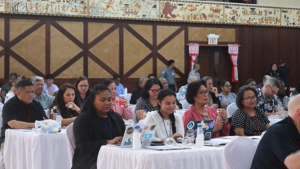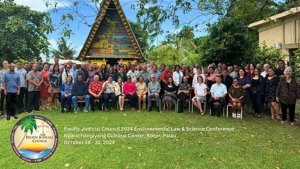
The University of Hawaiʻi at Mānoa played a pivotal role in the Pacific Judicial Council’s (PJC) Environmental Conference held in Palau, which featured discussions on the judiciary’s role in addressing pressing environmental challenges in the Pacific region. Faculty and students from the Kewalo Marine Laboratory (KML), William S. Richardson School of Law and Department of Natural Resources and Environmental Management (NREM) served as speakers and panelists at the October event.
Speakers included Nicole Yamase, who earned her PhD from UH Mānoa in marine biology in 2022, and Alexi Meltel, a UH Mānoa PhD candidate in marine biology, conducting her dissertation research in Palau and at KML. Yamase is Pohnpean, and the first Micronesian woman to earn her PhD in marine biology. Meltel, who is Palauan, will be the second.

Experts noted that many of those challenges are now being addressed through lawsuits, and it is critical that the courts have the required knowledge to guide their decision-making.
“The fact that the Pacific Judicial Council is engaging with regional scientists is truly wonderful and cause for optimism that accurate science can lead to critically important outcomes that affect our natural resources and all who depend on them ecologically, economically and culturally,” said Research Professor and Director of KML Bob Richmond, who served as the conference organizer for the scientific panels.

The three-day conference focused on climate change, marine pollution, fisheries and economics as well as the intersection between law and science including recent court decisions.
“This conference provided invaluable education and training on the use of science as the core of decision making and action on the most pressing issues facing the Pacific, such as the protection of the marine environment and climate change,” said Professor Sherry Broder from the William S. Richardson School of Law, who provided the legal framework and context for addressing environmental problems in the courts. “Understanding how to use science as the basis for decision making in policy and law contributes to the development of protections of the environment.”
The audience included more than 100 judges, justices, legislators and leaders from across the Pacific, including Guam, Palau, the Federated States of Micronesia, Kiribati, Samoa, Tuvalu and the Marshall Islands.
“It was a unique and somewhat intimidating experience to translate science for justices, judges, and lawyers in the region,” said NREM Professor Kirsten Oleson, who presented on the economic impacts of environmental damage and degradation. “I enjoyed discussions about how science and law intersect. Many people seemed to appreciate learning how we rigorously assign monetary metrics to nature’s benefits. It is important to give them confidence in the numbers when, for instance, dealing with damage liability or safeguarding the public trust.”

